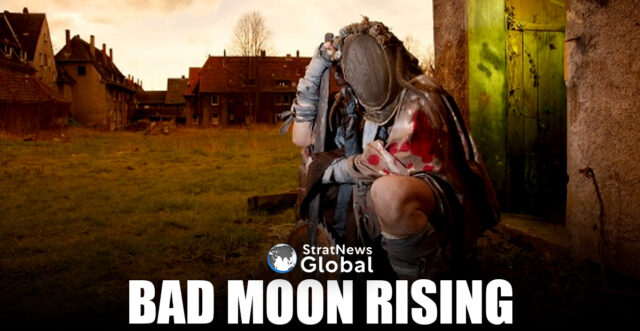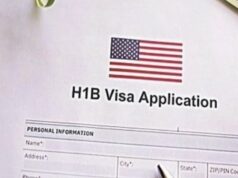Turbulence, doom, disruption, and existential threats: that’s the stark warning laid out in the fourth edition of the Atlantic Council’s “Welcome to 2035” report.
The coming decade, it predicts, will see global instability reaching new heights, fueled by climate disasters, technological upheaval, geopolitical fractures, and societal discontent.
The very fabric of the international order is unravelling, with a fractured West struggling to contain the rise of authoritarian regimes, a deepening crisis of democracy, and a world economy strained by resource scarcity and technological displacement.
Add to this a wave of cyber threats, rogue artificial intelligence systems and growing ideological extremism, and the future looks more dystopian than utopian.
But the report does not just dwell on doom and gloom.
It also envisions paths toward resilience, cooperation, and innovation. If policymakers, businesses, and societies take decisive action, the same forces driving chaos could be harnessed for global progress. Advances in artificial intelligence, biotechnology, and renewable energy have the potential to revolutionize human life for the better. Geopolitical alliances, if restructured effectively, can counterbalance rising threats and reinvigorate democratic governance.
A renewed emphasis on ethical technology, climate action, and inclusive economic policies could prevent the worst-case scenarios from materializing. The report ultimately presents a call to action, urging global leaders to act boldly in shaping a more secure and prosperous 2035.
Technology sits at the heart of both the promise and peril ahead. The exponential growth of AI, quantum computing, and synthetic biology opens up a Pandora’s box of ethical dilemmas and security risks. The report warns of AI-powered disinformation campaigns, mass job displacement, and even the possibility of autonomous weapons challenging state control.
However, these same technologies, if properly governed, could drive scientific breakthroughs, eradicate diseases, and enhance human capabilities in unprecedented ways.
Geopolitical tensions will continue to shape the world order, with the U.S.-China rivalry intensifying and a multipolar world emerging.
The Atlantic Council anticipates a shift away from traditional superpower dominance, replaced by regional power blocs and fluid alliances. This fragmentation poses risks—such as regional conflicts and economic volatility—but also opportunities for new diplomatic frameworks to emerge.
Climate change remains an existential challenge, with the report emphasizing the urgency of decarbonization. By 2035, without aggressive intervention, the world could experience irreversible environmental tipping points, with extreme weather events, water shortages, and mass displacement becoming the norm.
Yet, breakthroughs in clean energy, carbon capture, and geoengineering could still offer a path toward climate stabilization—if political will can match scientific capability.
Ultimately, “Welcome to 2035” paints a dual narrative: one of impending crisis and doom but also of radical transformation. The next decade will be a defining one, demanding that global leaders and institutions adapt swiftly, embrace innovation responsibly, and navigate an increasingly complex world with foresight and determination.
But if some of the responses of the over 350 global strategists and foresight practitioners surveyed in late 2024 for this report are any indication, for now, the mood seems pretty bleak.
• Global Outlook:
o 62% of respondents believe the world will be worse off in a decade, while 38% think it will be better.
• Potential for Global Conflict:
o 40% anticipate a multi-front great power war by 2035.
o 48% expect nuclear weapons to be used by at least one actor in the next decade.
o 45% foresee military conflicts extending into space.
• Tensions with China and Russia:
o 65% agree that China will attempt to retake Taiwan by force within the next ten years.
o 45% believe Russia and NATO will engage in a direct military conflict in the same timeframe.
• Emerging Alliances:
o 47% predict the world will be divided into China-aligned and US-aligned blocs by 2035.
o Among them, nearly 60% expect Russia, Iran, and North Korea to be formal allies with China.
o India’s strategic autonomy will continue, with 66.5 % saying New Delhi will not be exclusively aligned with any other great power.
• Nuclear Proliferation:
o 88% anticipate at least one new country will acquire nuclear weapons in the next decade, with 73% identifying Iran as the most likely.
o 40% expect South Korea to develop its own nuclear arsenal.
• US Power and Influence:
o 71% believe the US will remain the world’s dominant military power in 2035.
o 58% see the US as the leading technological innovator.
o However, less than half expect US dominance in economic (49%), cultural (35%), and diplomatic (24%) spheres.
• ‘Democratic Depression’:
o 48% foresee the current democratic recession worsening into a “democratic depression.”
o 65% predict a decline in global press freedoms by 2035.
Read the Full Report here.
In a career spanning three decades and counting, Ramananda (Ram to his friends) has been the foreign editor of The Telegraph, Outlook Magazine and the New Indian Express. He helped set up rediff.com’s editorial operations in San Jose and New York, helmed sify.com, and was the founder editor of India.com.
His work has featured in national and international publications like the Al Jazeera Centre for Studies, Global Times and Ashahi Shimbun. But his one constant over all these years, he says, has been the attempt to understand rising India’s place in the world.
He can rustle up a mean salad, his oil-less pepper chicken is to die for, and all it takes is some beer and rhythm and blues to rock his soul.
Talk to him about foreign and strategic affairs, media, South Asia, China, and of course India.





